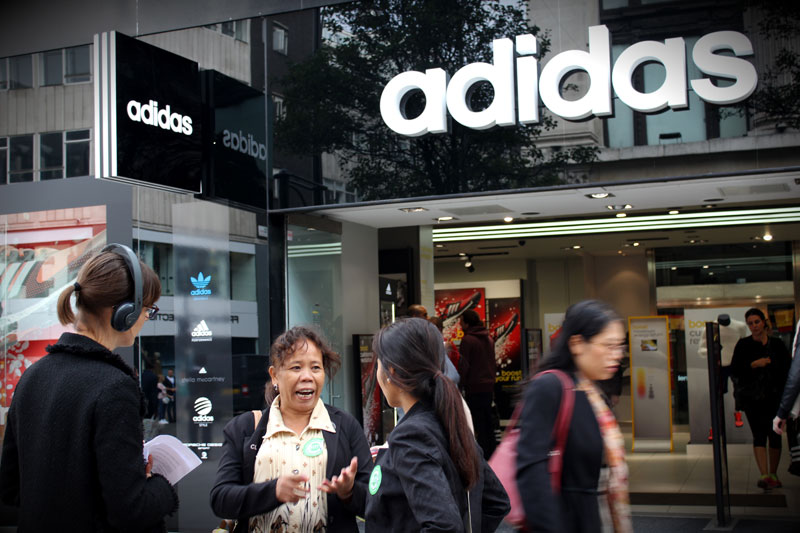Last week, Cambodian garment worker Eam Rin visited the flagship store of global sports brand Adidas on London’s Oxford Street, the busiest shopping street in Europe. It was the first time the widowed mother of five had left Cambodia and, after traveling thousands of kilometers, she found herself in a different world.
Ms. Rin and her family live in a cramped one-bedroom apartment in Phnom Penh close to her job at a factory inside Canadia Industrial Park, where she makes clothes for Adidas and other well-known fashion labels, earning a guaranteed salary of $100 per month, the industry’s minimum wage.

When she saw the price tags hanging on the clothing racks in the London store, she couldn’t believe her eyes.
“I had no idea that Adidas charged so much money for its clothes on the international market. Some of their clothes cost more than our entire monthly salary,” she said.
Ms. Rin, 46, was invited to London by U.K.-based workers rights group Labor Behind the Label to mark the “global day of action” on September 17, which was organized by international and Cambodian trade unions to push for a monthly salary of $177.
Last year, a series of protests followed the government’s announcement of a new minimum wage that fell well short of the unions’ $160 demand. The industrial action was violently quashed after military police shot dead at least five rock-throwing protesters and wounded scores more.
Ms. Rin, who is a representative of the Coalition of Cambodia Apparel Workers’ Democratic Union and was part of those protests, said she wanted British buyers to learn about the people who make their clothes and the hardships that they face.
“We handed out leaflets and spoke to people on the street and they all supported our demands. They knew of the country where their clothes were produced but many of them weren’t aware of the working conditions,” she said.
Hannah Smith, media and outreach manager for Labor Behind the Label, said that Ms. Rin also visited schools and talked to students about life as a garment worker in Cambodia.
“When 40 year-10 students were asked whether Eam’s talk had made them feel differently about where their clothes come from, every single hand in the class went up,” Ms. Smith said.
Back in her home province of Kompong Cham on Wednesday, where she celebrated the end of Pchum Ben with her family, Ms. Eam was unsure about where the responsibility lies for ensuring workers in Cambodia’s biggest industry are treated fairly.
“When companies come to invest in our country, they are forced to pay bribes at all levels of authority and this puts off many businesses with good intentions and means big companies who do come must cut costs, which impacts upon our people,” she said.
Ms. Rin also said that so far the government seemed more committed to suppressing workers rights than improving their livelihoods, and nothing seemed to be changing during the latest round of negotiations.
On the day Ms. Rin arrived in London, the Phnom Penh Municipal Court placed the president of her union, Ath Thorn, under judicial supervision—preventing him from joining protests or communicating with other union leaders—for his alleged role in violent protests on Veng Sreng Street in January.
Ms. Eam said she didn’t imagine this would happen in the U.K.
“In Cambodia, there is no justice for workers and we have seen over and over that the authorities clamp down on our rights, but in the U.K., no one interrupted us and our right to protest was respected,” she said.
Witnessing firsthand the disconnect between the lives of Cambodian garment workers and the lifestyles of those who can afford the clothes they make has left her more committed than ever to the fight for a decent wage.
“We cannot live like animals anymore and we will do whatever is necessary to push through this minimum wage increase,” she said. “They might not see it but their country [the U.K.] looks like heaven, while to us, ours looks more like hell.”



